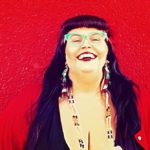Mixedblood Girls II
Mixedblood girls who date
white boys are traitors to their race
cuz “girl don’t you know you’re supposed to up your blood quantum?”
Mixedblood Girls who date
black guys isolate family
cuz don’t you know grandma & grandpa spent a lifetime
pretndin they “really weren’t them Freedmen folk.”
Keepin’us separated from family. There’s more than one kind of rez.
Mixedblood girls who date
other mixedblood girls
learn to keep their faces up,
wear their tattoos like shawls of tradition,
& teach other mixedblood girls songs of their grandmothers
full, throaty, and rich with defiance of being mixedblood girls
who didn’t claim to be anything else.
Hard
Trace lines, limbs of black
ink over shoulder, down deltoid, skirting
left of your spine, to root on hip and buttocks—
a journey my tongue has memorized.
Long slightly callused fingers
grip my wrists, pull hands
away from bulk of belly—
refusing my self-shame in this body.
So I learn
To love having curves, rolls,
large breasts, hapullo nia, and lip-slicked lips —
the way my fat cis-fem body cradles
your tall, hard, butch body.
Opening dimpled soft thighs
to rough fingers, firm lips, harsh tongue,
your silicon that is always hard—
brown eyes always soft.
D/s
I don’t understand
how you want this body—
its all hanging in a language
of dimples, cellulite, stretchmarks.
Perhaps it is a physical
manifestation of my compliance—
the truth of my submission.
This is the place of letting go.
Your mouth, hands, sex,
hardness to my softness.
Your words break open
make me burn, leak, cry
in want from eyes to thighs.
There is trust in this.
The truth that outside
these doors I am power.
Never giving up control
but here—
I release, from calloused palm
marking across width of my ass,
shock of rings in breasts pulled
until your mouth assuages pain.
That I am a cradle
holding your body—
and you need me
a partner in the choreography
of our flaws.
Of Settlers and Serial Killers
My womb is a barren killing field.
Take it like Cavalry soldiers took
our mothers, our grandmothers,
our great-grandmothers’ uteruses.
Let it carry testimonies in its lining
continuing to shed blood tears
long after removed from the body.
Have they taught you how to read the way blood
dries on skin like you would read tea leaves in a cup?
He says,
“tell me are you blue?”
When I sing blues turn
my red skin purple like
the bruises, the bruises, the bruises
purple turn black, then blue, and fade
like a body left to rot in the muck.
Have they taught you how to translate the way bruises
flower on skin like you would interpret lines of code?
Is this why you took our bones, our flesh,
our DNA, stuffed it in drawers to silence
the screaming, to muffle the crying,
the annals of flesh you keep like
serial killers keeping trophies.
Have they taught you how to read the way tears
fall on skin like you would read tea leaves in a cup?
You sit in nests we have built carrying
splintered tibias, fractured phalanges,
sinew that once held our grandfather’s ankles stable,
lined with our children’s’ hair shorn, cut,
and the meconium of grandmothers who
expelled their children in fields they were shackled.
Have they taught you how to translate the structures
of our survival like you would interpret lines of code?
And so, you sit in our nests like
hungry birds, lips open waiting
for us to vomit into your mouths’
the essence of us turned acidic in bile
of holding back our tongues —
that you might have the last bit of nourishment
we housed in our bellies keeping it camouflaged
under our diabetic skin.
Our act of living remains nothing
but an exhibition for your entertainment.

Rain Prud’homme is aFATtastically queer IndigeNerd who reads too much and drinks too much black tea. Her books include Smoked Mullet Cornbread Crawdad Memory (MEP 2012, as Rain C. Goméz, First Book Award Poetry, Native Writers’ Circle of the Americas), Miscegenation Roundance: Poèmes Historiques (fall 2020 Mongrel Empire Press), and the co-edited collections Louisiana Creole Peoplehood: Tracing Post-Contact Afro-Indigeneity and Community (University of Washington, 2021) and Indians, Oil, & Water: Indigenous Ecologies and Literary Resistance (TPHP 2020). Current projects include: Gumbo Stories: Rhetorics and Quantum Relation-Making in Trans-Indigenous South; Epidermal Journal (poetry); and “I oughta know about lonely girls:” Essays on Body, Love, & Place. She is co-Executive Editor of That Painted Horse Press and a professor at the University of Calgary.

 BACK TO ISSUE
BACK TO ISSUE